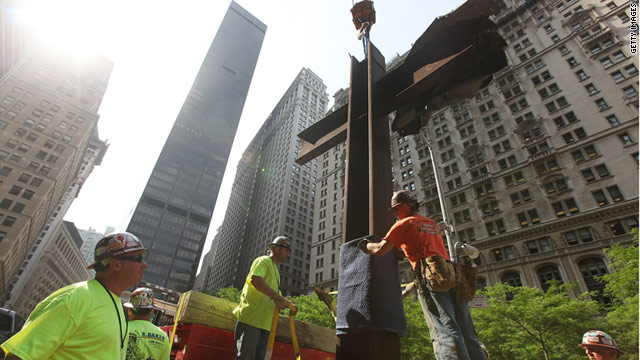CNN's writer, John Blake, found three significant changes in Americans' faith practices since then:
- The humiliation of the attacks had altered Americans' self-identification as a "chosen" nation
- Interfaith forays were more acceptable, with Muslims making inroads to mainstream culture and cooperating with Christian groups more often.
- Atheism had become a forceful, militant idea. It came out of the closet.
- I would add a fourth: the unholy marriage between Christian fundamentalism and Zionism that lured the nation into two world wars--and nearly a third in Iran, had not cooler heads prevailed.
For me, 9/11 was a faith touchstone. It didn't seem like such a big deal at the time. I was a practicing Christian then; I am a Christian today. But looking back, I think it raised some questions that I had no hope of finding answers to at the time.
I remember that I had children's story the weekend after the attacks. Like everyone else that day, I was stunned, still unable to put the attacks--and the ongoing investigation--into perspective. As I remember it, I chose John 1.5 for my text: "The light shines in the darkness, and the darkness has not overcome it." At the time, there seemed to be a lot of darkness in my country, but I knew the Light, and I wanted kids to have that hope.
Still, I made a reference to how difficult it was to have faith. I had sung, "He's got the Whole World in His Hands" with Ellie that week before the attacks, and it just seemed contradicted. I was trying to find a place in which God could fit in this fallen world.
I was not helped by the sermon that day: "God is still in control." It felt to me that the pastor wasn't encouraging us to confront the issues that had been raised, but to cling tighter to a slogan that had been used before in other contexts: when the church budget was out of balance, when a member needed help finding a job, when leaders had failed us. Wasn't 9/11 bigger than that?
I'm not sure that September of 2001 was when I began searching further afield for answers to my spiritual questions. I have always been independent when it came to theology. I think I did become more open about it, reading sources in history, archaeology, and literature to confirm the tenets of my faith. I read critiques of the Bible, and consumed books by Muslims and atheists. I even organized an interfaith dialogue at the Highland Church with some Muslim friends I had made at Western Kentucky University (where I was wrapping up my graduate degree, and visiting the Islamic Center on occasion).
The more I looked, the more answers I found. My Christian faith was strengthened, but my connections to the Adventist Church were strained. "God is in control" wasn't going to cut it for me. A national tragedy wasn't a "sign," it was an opportunity for us to become something greater as a nation.
Five years later, spiritually exhausted by uncivil battles over worship styles, Jenny and I visited Bethpage United Methodist Church, and we found a new home in a denomination that shared our focus on Jesus Christ and the Kingdom of God. It was a group of Christians who reacted to tragedy with compassion, not "I told you so."
I think that I was looking for this kind of community that Sabbath after 9/11, and probably for many years before that. I wish that my country could have found it. Instead we were misled. The loss of all those innocent people in New York, Washington, and Pennsylvania was used to justify torture, the deaths of tens of thousands of Iraqis, a loss of freedom here at home, and oceans of debt.
I don't want to overblow 9/11. I do appreciate any chance I get to look back and assess the changes that I've made. It wasn't one event that led me to this point on my faith journey, it was many events, all orchestrated by a loving God and witnessed by my incredible family.

No comments:
Post a Comment